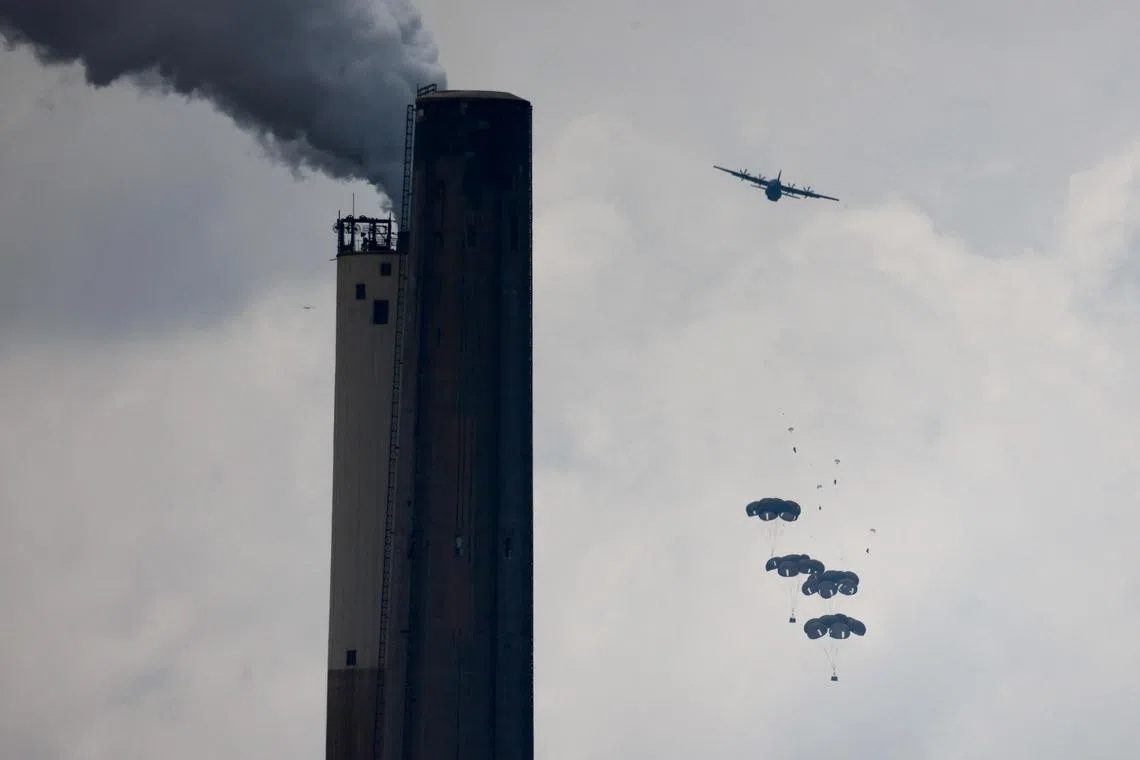Gaza fighting rages amid ‘horror and starvation’, truce talks
Sign up now: Get ST's newsletters delivered to your inbox
Follow topic:
CAIRO – Heavy fighting raged in the Gaza Strip on March 24, as truce talks lumbered on in Qatar, amid what the head of the United Nations described as “horror and starvation”.
Israeli forces besieged two more hospitals in the southern city of Khan Younis, pinning down medical teams under heavy gunfire, according to the Palestinian Red Crescent.
The Red Crescent said one of its employees was killed when Israeli tanks suddenly pushed back into areas around Al-Amal and Nasser hospitals amid heavy bombardment and gunfire.
It said Israeli armoured forces sealed off Al-Amal Hospital and carried out extensive bulldozing operations in its vicinity.
“All of our teams are in extreme danger at the moment and are completely immobilised,” the Red Crescent said.
It added that Israeli forces were now demanding the complete evacuation of staff, patients and those seeking refuge from Al-Amal’s premises and firing smoke bombs to force them out.
The Israeli military insisted that its forces were hitting “infrastructure” in Khan Younis used as gathering points for many militants.
Hamas denies using hospitals for military ends and accuses Israel of war crimes against civilian targets. Israeli officials said some 480 militants were captured in continued clashes at Gaza’s main Al-Shifa Hospital.
The health ministry in Hamas-run Gaza, on the other hand, said dozens of patients and medical staff were detained by Israeli troops at Al-Shifa.
Al-Shifa – in Gaza’s north, which has been under Israeli control for a week – is one of the few healthcare facilities that are still partially operational in northern Gaza.
Like other hospitals, it has also been housing some of the nearly two million civilians – over 80 per cent of Gaza’s population – displaced by the war.
Khan Younis residents said Israeli tanks also advanced in a western neighbourhood near Nasser Hospital under cover of heavy fire from the air and ground.
‘Non-stop nightmare’
In Rafah, Gaza’s southernmost town on the Egyptian border that has become the last refuge for half of Gaza’s uprooted population, an Israeli air strike on a house killed seven people, health officials said.
Rafah resident Hassan Zanoun was among those whose homes were reduced to a jumble of broken concrete and rubble in the air strike.
“My children and I were sleeping here,” he said. “I was surprised. We didn’t hear the sound of a rocket, and suddenly everything was unleashed over our heads... strikes, screams.”
At least 32,226 Palestinians have been killed, among them 84 in the past 24 hours, and 74,518 injured in Israel’s air and ground offensive into densely populated Gaza since Oct 7, said the Hamas-run health ministry.
Hamas said Israel also launched more than 60 air strikes, as well as artillery bombardment, on Gaza City, the southern urban centre of Khan Younis and other areas.
Israel’s military said fighter jets struck about 65 targets, “including a terror tunnel used to carry out attacks, military compounds where armed terrorists operated and additional military infrastructure”.
Writing on social media platform X, United Nations chief Antonio Guterres said “horror and starvation stalk the people of Gaza”, as he again urged an immediate ceasefire and the release of all hostages held since Oct 7.
In a visit on March 24 to the Egyptian border with the coastal territory, Mr Guterres urged an end to the “non-stop nightmare” endured by Gaza’s 2.4 million people.
He said “nothing justifies” either the Oct 7 attack
Writing on X, Mr Guterres added: “Any further onslaught will make everything worse. Worse for Palestinian civilians, for the hostages, for all people of the region. It’s more than time for an immediate humanitarian ceasefire and the immediate release of all hostages.”
The war was triggered when Hamas militants broke through the border fence into southern Israel in a shock rampage on Oct 7, killing at least 1,200 people and taking 253 hostages back to Gaza.

Humanitarian aid being airdropped on March 24 on the Gaza Strip, where aid officials say famine is imminent unless Israel reopens more land routes.
PHOTO: REUTERS
Still deadlocked
Concerted mediation by Qatar and Egypt, backed by the United States, has so far failed to secure a Hamas-Israel ceasefire, prisoner releases and unfettered aid to Gaza civilians facing famine, with each side sticking to core demands.
US intelligence chief Bill Burns and his Israeli counterpart David Barnea departed Doha, in Qatar, late on March 23 following talks on a temporary truce in Gaza and a hostage exchange, a source briefed on the talks told AFP.
The latest negotiations “focused on details and a ratio for the exchange of hostages and prisoners”, the source said, adding that technical teams remained in Qatar.
A major sticking point has been Hamas’ position that a temporary truce must lead to a permanent Israeli withdrawal from Gaza, a demand Israel has rejected.
A Hamas official with knowledge of the talks said on March 24 that “there is a deep divergence in positions in the negotiations” in Doha.
The official said Israel “refuses to agree on a comprehensive ceasefire and refuses the complete withdrawal of its forces from Gaza”. AFP, REUTERS

